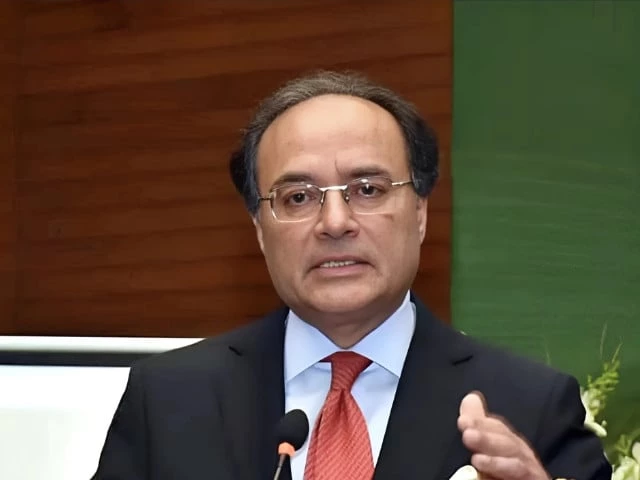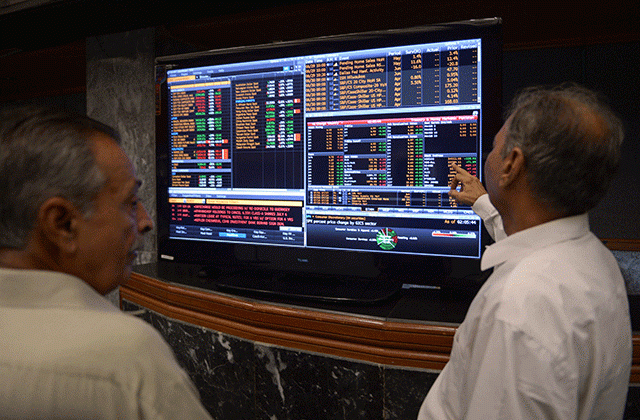Business
IMF recognises scale of disaster as country battles floods | The Express Tribune

KAMALIA:
Finance Minister Muhammad Aurangzeb said on Sunday that Pakistan has been in close contact with the International Monetary Fund (IMF) as the global lender has shown understanding on the ongoing crisis, triggered by the recent floods.
During a visit to Kamalia tehsil in Toba Tek Singh, one of the worst-hit areas, the minister said, the government is prioritising and preferring to use domestic resources before seeking additional funds. “The whole world is watching the difficulties being faced by the Pakistani people,” he remarked.
Aurangzeb noted that infrastructure, including roads, bridges, and houses, had been badly damaged. He added, it would be inappropriate to send electricity bills to residents in disaster-hit zones at this stage.
Expressing gratitude, saying that the loss of life in Toba Tek Singh remained minimal, the minister prayed for the floodwaters to recede quickly so that farmers could begin planting the next crop. “We will rebuild the infrastructure and restore it to its original condition,” he assured.
Aurangzeb also praised the scale of the ongoing relief operation, calling it unprecedented in the country’s history. He extended special thanks to the Pakistan Army for their role in rescue and relief activities.
Earlier on Friday, the IMF expressed concern and deep sorrow over the loss of lives in Pakistan’s recent devastating floods and announced that its second economic review mission would also assess the disaster’s impact on the economy, as well as the financial requirements for the recovery and reconstruction.
According to sources, the IMF team will evaluate whether Pakistan’s fiscal policies and emergency measures are sufficient to deal with the crisis.
Business
Stocks Of Indian Company, With Just 2 Workers, Shot Up 55,000% Over Something That It NEVER Manufactured!

Last Updated:
RRP Semiconductor Ltd.’s spectacular stock rally is making headlines, but the company isn’t what its name suggests.
There is an ongoing probe on the shocking share surge. (Representative Image)
The stock market can be full of surprises, but few stories are as bizarre as this one. An Indian company, RRP Semiconductor Ltd., has seen its stock soar by a mind-blowing 55,000% in just 20 months, all this while reportedly having just two employees. What makes the story even stranger is that, despite its name, the company does not manufacture semiconductors at all.
The sheer absurdity of such a small company seeing this kind of surge makes it one of the most surreal episodes in recent Indian stock market history.
Trading Restricted By Stock Exchanges
Trading in RRP Semiconductor Ltd. has now been restricted by stock exchanges. On the BSE, the stock’s page displays the notice, “Trading Restricted – on account of Surveillance Measure.” RRP Semiconductor has been placed under Stage 1 of the Long-term Additional Surveillance Framework and Stage 0 of the GSM framework, reported CNBC-TV18.
A 55,000% Rally That Defies Fundamentals
The over 55,000% in the 20 months till December 17 is by far the biggest gain worldwide among companies with a market value above $1 billion, reported Bloomberg. This is despite the company posting negative revenue in its latest financial results.
The jaw-dropping stock market story is also doing the rounds on Instagram. According to a reel, “Rs 10,000 invested in it would have grown to Rs 55 lakhs during this window.”
Name Change Sparks Frenzy
Until 2024, RRP was a little-known real estate firm called GV Trading and Agencies. Things changed when Rajendra Chodankar, the founder of RRP, struck a deal to take over GD Trading and Agencies by repaying a Rs 8 crore loan owed to its founders. Chodankar renamed the company RRP Semiconductor. That single word, semiconductor, proved to be a powerful magnet for retail investors.
As the reel explains, “The moment the word ‘semiconductor’ entered this company’s name, retail investors went crazy.”
The timing was perfect. Global chipmakers like NVIDIA were soaring, AI was dominating headlines and India had no listed pure-play semiconductor manufacturing companies. For many investors, this stock seemed like a rare entry point into a hot global theme.
Hype, Rumours, Star Power
Fuel was added by unverified claims swirling on social media, including false rumours of cricket great Sachin Tendulkar being associated with the company and talk of 100 acres of land being allotted.
The real driver of the dizzying rally lay elsewhere. According to September shareholding data, Chodankar and a few of his close associates hold over 90% of the shares, leaving very little free float in the market.
Myths Busted
The reel also busts the biggest myths outright. “The talks of Sachin Tendulkar, 100 acres of land, all of that is completely fake.”
The episode has become a cautionary tale for investors caught in the fear of missing out. The narrator says. “NVIDIA is up, AI is everywhere and India has no semiconductor stocks. But this is a classic example of that desperation being exploited.”
SEBI Launches Investigation
The Securities and Exchange Board of India (SEBI) has launched a probe into the company. The market regulator is examining the sharp rise in RRP’s shares for possible wrongdoing.
Delhi, India, India
December 20, 2025, 14:50 IST
Read More
Business
Bank Holiday Today: Are Banks Open Or Closed On December 20, 2025? Find Out

New Delhi: Many bank customers are unsure whether bank branches are open or closed today, Saturday, December 20, 2025, leaving them confused about whether to step out for important work or postpone their visit. With different banking schedules on weekends and varying services available on Saturdays, people are keen to know if branches are operating today or if it’s better to wait until a regular weekday.
Bank Holiday Status Today: Are Branches Open on December 20, 2025?
Banks are open today, as December 20, 2025 falls on the third Saturday of the month. In India, bank branches remain closed on the second and fourth Saturdays, while they operate normally on the first, third, and fifth Saturdays. Since today is the third Saturday, customers can visit physical bank branches for their regular banking needs.
Banking Services Available Even on Holidays
Even if banks are closed on a holiday, you don’t have to worry about urgent transactions. Online banking and mobile banking apps continue to work, even on national holidays, unless the bank informs customers in advance about maintenance or technical issues. For cash withdrawals and payments, you can rely on ATMs, internet banking, fintech apps, and UPI services, which remain available round the clock.
December 2025 Bank Holidays: State-Wise List to Keep in Mind
Here’s a quick look at bank holidays falling in different states during December 2025, so you can plan your branch visits accordingly:
December 20, 2025 (Saturday): Banks remain closed in Sikkim on account of the Losoong and Namsoong festival.
December 22, 2025 (Monday): Banks are again closed in Sikkim to mark the Losoong and Namsoong festival.
December 24, 2025 (Wednesday): Banks will be shut in Mizoram, Nagaland and Meghalaya due to Christmas Eve.
December 25, 2025 (Thursday): Banks across India remain closed to celebrate Christmas.
December 26, 2025 (Friday): Banks are closed in Mizoram, Nagaland and Meghalaya as part of Christmas celebrations.
December 27, 2025 (Saturday): Banks remain closed in Nagaland on account of Christmas.
December 30, 2025 (Tuesday): Banks are closed in Meghalaya to observe the death anniversary of U Kiang Nangbah.
December 31, 2025 (Wednesday): Banks are shut in Mizoram and Manipur for New Year’s Eve and Imoinu Iratpa festival.
Business
VB G RAM G: A Reimagined Rural Employment Guarantee With A Development Thrust

Last Updated:
Modi government’s VB G RAM G Bill replaces MGNREGA, raising job days from 100 to 125, boosting tech-driven transparency, and enhancing state flexibility amid Opposition protests.
Since FY15, the cumulative budgetary allocation to MGNREGA has reached Rs 8.64 lakh crore, about 3.6 times that of the UPA period.
As the Modi government introduced the VB G RAM G Bill — Viksit Bharat – Guarantee for Rozgar and Ajeevika Mission (Gramin) in the Lok Sabha, replacing MGNREGA, the Opposition, including the Congress, vociferously protested and tore copies of the legislation in the well of the House, irked by the absence of Mahatma Gandhi’s name. Realising its bankruptcy of issues, the Congress latched onto this matter hurriedly, without examining the fine print—where none existed. What the Congress fails to acknowledge is that rural employment schemes have existed since the 1960s, and even MGNREGA did not carry Mahatma Gandhi’s name when the Bill was legislated in 2005.
Improvements to MGNREGA since 2014-15
The implementation of MGNREGA during the UPA years was riddled with weak oversight, patchy execution, and relatively shallow budget allocations. Since FY15, the cumulative budgetary allocation to MGNREGA has reached Rs 8.64 lakh crore, about 3.6 times that of the UPA period. This includes stepped-up expenditure of Rs 1.12 lakh crore during crisis periods such as the Covid pandemic.
This exponential increase in allocation translated into visible improvements in women’s participation, person-days generated, and the creation of durable rural assets. Unlike the UPA era, digitisation and geotagging of photographs have aided in improving transparency and facilitating timely payment of wages.
However, despite the ramp-up in implementation, several irregularities and structural issues — such as fake job cards, chronic delays in wage payments, quality and durability deficits in assets, and accountability gaps — have been highlighted in various Departmentally Related Standing Committee reports.
The Bill: Differentiation across multiple dimensions
The new Bill represents a comprehensive revamp of MGNREGA while retaining the core employment guarantee. It raises the guaranteed wage employment from 100 days to 125 days per household per financial year, covering more than a third of the year. While convergence, saturation, and a whole-of-government approach existed operationally under MGNREGA, these principles have now been formally embedded in the legislation, reinforcing the commitment to rural resilience and prosperity.
The Bill also mandates that wage payments be made within seven days of completion of work, compared to the earlier ceiling of 15 days.
The most defining feature of the Bill is its emphasis on technology-enabled planning, transparency, and accountability. All Viksit Gram Panchayat Plans will be aggregated into the Viksit Bharat National Rural Infrastructure Stack and integrated with the PM Gati Shakti National Master Plan to enable spatially optimised infrastructure development. Artificial intelligence will also be leveraged for planning, audits, and fraud-risk mitigation.
Biometric authentication of workers, mobile application-based and dashboard-based monitoring systems providing real-time visibility of demand, works, workforce deployment, payments, and progress, along with weekly public disclosure mechanisms — both digital and physical — covering key metrics, muster rolls, payments, sanctions, inspections, and grievance redressal — form a robust technology-driven transparency and accountability framework.
Enhancing responsibility, predictability, flexibility, and accountability for states
Earlier, states received 32 percent devolution from central taxes. This was increased to 42 percent by the Fourteenth Finance Commission. In alignment with this shift, VB G RAM G will be implemented as a centrally sponsored scheme with a 60:40 Centre-state funding pattern, replacing the earlier central sector structure.
States will also have greater flexibility to allocate funds, based on Viksit Gram Panchayat Plans, to those gram panchayats that need them the most, thereby addressing regional disparities more effectively. The Bill introduces normative allocations, enabling states to better predict finances and plan works in advance.
With technology-driven governance and the liability resting on states to provide unemployment allowance if work is not provided within 15 days, states are firmly brought within the accountability framework. When analysed together, the employment guarantee and panchayat plans clearly reinforce the demand-driven character embedded in the Bill.
Relief for farmers and support to agriculture
Agriculture and allied activities play a critical role in food security and contribute significantly to GDP. As the annadata is a key stakeholder in the vision of Viksit Bharat, farmer welfare remains a core focus of the Modi government. Initiatives such as PM-KISAN, PMFBY, the announcement of 50 percent returns over cost in MSP, and GST 2.0 reforms, including a reduction in GST on key farm inputs to five percent, reflect this commitment.
Yet, persistent challenges remain in agricultural production, with implications for food security. One major issue is the chronic labour shortage during peak sowing and harvesting periods. This concern was also flagged by the Standing Committee on Rural Development in its 2012–13 report on MGNREGA, which noted that MGNREGA works during peak agricultural seasons adversely affect labour availability for farming. While the department acknowledged the issue, it had earlier rejected a blanket ban on works during peak periods.
Recognising this challenge, and considering that over 80 percent of farmers are small and marginal, farm mechanisation levels remain low, and more than 45 percent of the cost of cultivation is labour-related, the Bill empowers states to notify, in advance, a period aggregating up to 60 days in a financial year covering peak sowing and harvesting seasons during which works under the scheme will not be undertaken. This ensures adequate availability of farm labour during critical agricultural operations.
Another major concern is that over 50 percent of India’s net sown area remains monsoon-dependent, exposing food production to high rainfall variability. With water security identified as one of the four thematic focus areas, water-related works such as irrigation support and groundwater recharge will strengthen agricultural resilience. The other thematic focus areas—connectivity, storage, and protection from extreme weather—also provide direct and indirect support to farmers.
Conclusion
The transformative VB G RAM G Bill represents continuity rather than rupture, carrying forward the spirit embedded in MGNREGA while addressing its structural shortcomings. By raising the employment guarantee from 100 to 125 days, strengthening execution through technology-enabled planning, payments, and oversight, and enhancing state participation and accountability, the Bill seeks to elevate rural employment guarantees to the next level.
In doing so, states are also poised to reap positive spillover effects across agriculture and rural infrastructure, making VB G RAM G a more holistic instrument for rural development in a Viksit Bharat.
December 20, 2025, 07:32 IST
Read More
-

 Business7 days ago
Business7 days agoHitting The ‘High Notes’ In Ties: Nepal Set To Lift Ban On Indian Bills Above ₹100
-

 Tech6 days ago
Tech6 days agoFor the First Time, AI Analyzes Language as Well as a Human Expert
-

 Business5 days ago
Business5 days agoKSE-100 index gains 876 points amid cut in policy rate | The Express Tribune
-

 Business1 week ago
Business1 week agoIPO Explained: Meaning, Process, Benefits, Risks
-

 Sports5 days ago
Sports5 days agoJets defensive lineman rips NFL officials after ejection vs Jaguars
-

 Business5 days ago
Business5 days agoStudying Abroad Is Costly, But Not Impossible: Experts On Smarter Financial Planning
-

 Tech1 week ago
Tech1 week agoCursor Launches an AI Coding Tool For Designers
-

 Fashion1 week ago
Fashion1 week agoCAI seeks scrapping of India’s 11% cotton duty to protect industry





